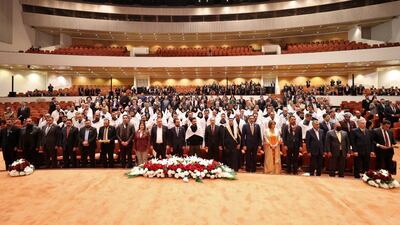Iraq's parliamentary session to elect a new president on Monday fell into disarray following a boycott by major political parties.
By late afternoon, quorum had not been reached to hold the vote with less than 60 MPs out of 329 in attendance.
The meeting in the Council of Representatives was then turned into a deliberative session where MPs discussed several issues such as agriculture and forming parliamentary committees.
The position of president will likely remain vacant until quorum can be made — something that appears unlikely to occur soon amid political deadlock.
The Kurdish Democratic Party, the Sadrist Bloc and their rivals — parts of the Shiite majority Co-ordination Framework — said they would boycott the session because of competing demands on presidential candidates.
Sunni parties Taqadum and the Azm Coalition also said they would boycott the vote.
Iraq's constitution requires that at least two thirds of MPs are in Parliament to pass legislation and elect members to high office.
An independent lawmaker said the fate of the vote on the President is unknown, chastising the parliament’s major blocs for not showing up.
“We are keen to adhere to the time-frames set by the constitution,” Mohammed Enooz told a press conference at the Parliament.
“But unfortunately there are political traditions and norms controlled by the big blocs as in previous parliament terms,” he added.
The assembly vote had been set for noon for the head of state — a post with a four-year mandate held by convention by a member of Iraq's Kurdish minority, and currently occupied by Barham Saleh.
The process toward a presidential vote had been further thrown into disarray when Iraq's Supreme Court on Sunday suspended the candidacy of Mr Saleh's key challenger, Hoshyar Zebari, 68.
The court cited corruption charges against Mr Zebari, a former foreign minister from the KDP — allegations he denies.
"I have not been convicted in any court," Mr Zebari had said in a television interview on Friday as the charges resurfaced alongside forecasts he would unseat Mr Saleh.
Incumbent Saleh, the other frontrunner out of some 25 candidates, represents the KDP's main rival in Iraqi Kurdistan, the Patriotic Union of Kurdistan (PUK).
The Supreme Court said it was suspending Mr Zebari after receiving a complaint from lawmakers that his candidacy was "unconstitutional" because of the graft claims.
The complainants cited his 2016 dismissal from the post of finance minister by parliament "over charges linked to financial and administrative corruption".
The complaint also cited at least two other judicial cases linked to him, including when he was Iraq's long-time foreign minister after the fall of dictator Saddam Hussein in the 2003 US-led invasion.
Therefore, Mr Enooz said, the “session will be open until a decision is made on the case filed against the nomination of Mr Zebari at the court”.
Drawn-out government formation
The mass boycott represents another setback for political momentum in Iraq following the contested outcome of an election in October.
Government positions, including the cabinet, cannot be formed without the president's nomination of the largest bloc in parliament.
That must occur within 15 days of the new president being elected. The largest post-election bloc can then choose the prime minister, who must form the next government within 30 days.
Legal expert Ali Al Tamimi told The National that the Supreme Federal Court decision to temporarily suspend the nomination of Mr Zebari has already pushed back the deadlines.
"Since there is an ongoing case against the nomination of Hoshyar Zebari and a decision to temporarily suspend his nomination that means today's session has been suspended too," Mr Al Tamimi said.
Current President Barham Salih will continue in his post, Mr Al Tamimi added.
In Iraq's fractured political landscape, any delay in this chain of events can drag out the process for months. Negotiations, including which party will be granted control of key ministries often go on behind closed doors during the duration of government formation.
Iraq at one point held the world record for government formation following elections in 2010, which failed to produce a government for 289 days.
That record was beaten by Belgium which saw negotiations drag on for 549 days between 2010 and 2011, after 11 parties were elected to the Chamber of Representatives.
In Iraq, the passing of the budget will now face even more economically damaging delays and political tensions are set to worsen.




